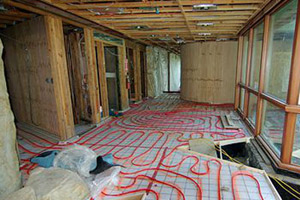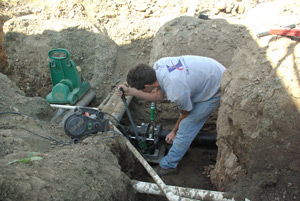 By offering the option of geoexchange, Air Connection gives builders and developers a new energy efficient, environmentally friendly, less expensive to operate option for their client's heating and cooling needs.
By offering the option of geoexchange, Air Connection gives builders and developers a new energy efficient, environmentally friendly, less expensive to operate option for their client's heating and cooling needs.
Geoexchange Fact Sheet for Builders and Developers*
- Sales of geoexchange systems over the past five years have grown an average of over 22 percent per year, with a 33% increase in 1999 (the latest year with data available).
- Geoexchange systems have a lower life-cycle cost than conventional systems, even in hot and humid regions where the demand for air-conditioning is high.
- Energy costs with geoexchange typically are 25 to 50 percent less than other HVAC systems.
- Surveys by utilities indicate a higher level of consumer satisfaction for geoexchange heat pumps than for conventional systems. Polls show that more than 95% of all geoexchange customers would recommend geoexchange to a family member or friend.
- Geoexchange offers design flexibility because the landscape is free of noisy condensers and other outdoor equipment.
- The elimination of outdoor equipment means the geoexchange system is not exposed to temperature extremes, dirt, pollution or vandalism.
- Geoexchange systems do not require a flue or chimney. There is less risk of fire, and no chance at all of carbon monoxide spilling back into the building from the heating system, because there is no on-site combustion.
- Geoexchange can reduce energy consumption--and corresponding emissions--by over 40% compared to air source heat pumps, and by over 70% compared to electric resistance heating, according to the EPA. Combining geoexchange with other energy-efficient measures, such as window or insulation upgrades, generates additional savings
- Installing just 400,000 geoexchange systems each year could reduce US greenhouse gas emissions by over 1 million metric tons of carbon each year. This reduction in carbon emissions is equivalent to converting over half a million cars to zero-emission vehicles, or planting over a million acres of trees.
Big Market, Bright Future*
 Geoexchange has been building its share of the HVAC market for 20 years, gaining support in both the public and private sectors. Today, it captures about one percent of the United States' $64 billion HVAC market. Market analysts expect that figure to grow to nearly seven percent early in the next century, carried on the demand for efficient, earth-friendly 'space conditioning.'
Geoexchange has been building its share of the HVAC market for 20 years, gaining support in both the public and private sectors. Today, it captures about one percent of the United States' $64 billion HVAC market. Market analysts expect that figure to grow to nearly seven percent early in the next century, carried on the demand for efficient, earth-friendly 'space conditioning.'
In the residential HVAC equipment market, there are two major sectors: new construction and residential retrofit. Currently, 66 percent of the activity is in the retrofit area, which includes energy upgrades, replacements, add-ons and remodeled units.
In new home construction, reasonable interest rates and favorable demographics are expected to fuel the home building industry for the foreseeable future. The largest increase is expected to be in the 35-64 age range-baby boomers who have higher income and higher standards of living.
Current data supports a scenario of continued growth across all market sectors. Over the past five years, unit sales nationally have climbed at an average of over 22 percent per year. The 22 percent growth rate represents an increase of over 10,000 units annually.
"People are recognizing the advantages," said Conn Abnee, executive director of the Geothermal Heat Pump Consortium, Washington, DC. "And the impact of that fact is being felt throughout the HVAC industry." An estimated seven million units are expected to be installed by the year 2010.
Geoexchange technology is currently being used throughout the United States and in several countries. Here's why:
- Geoexchange has a 25-year life cycle (50+ years for the ground loop piping) and is virtually maintenance free.
- Geoexchange systems have a lower life-cycle cost than conventional systems, even in hot and humid regions where the demand for air-cooling is high.
- Energy costs are 25 to 50 percent less than other conventional HVAC systems, depending on latitude.
- Geoexchange is a 'green' technology in that it reduces greenhouse emissions by 45 percent over other systems.
* Courtesy of IGSHPA (International Ground Source Heat Pump Association)
 By offering the option of geoexchange, Air Connection gives builders and developers a new energy efficient, environmentally friendly, less expensive to operate option for their client's heating and cooling needs.
By offering the option of geoexchange, Air Connection gives builders and developers a new energy efficient, environmentally friendly, less expensive to operate option for their client's heating and cooling needs. Geoexchange has been building its share of the HVAC market for 20 years, gaining support in both the public and private sectors. Today, it captures about one percent of the United States' $64 billion HVAC market. Market analysts expect that figure to grow to nearly seven percent early in the next century, carried on the demand for efficient, earth-friendly 'space conditioning.'
Geoexchange has been building its share of the HVAC market for 20 years, gaining support in both the public and private sectors. Today, it captures about one percent of the United States' $64 billion HVAC market. Market analysts expect that figure to grow to nearly seven percent early in the next century, carried on the demand for efficient, earth-friendly 'space conditioning.'